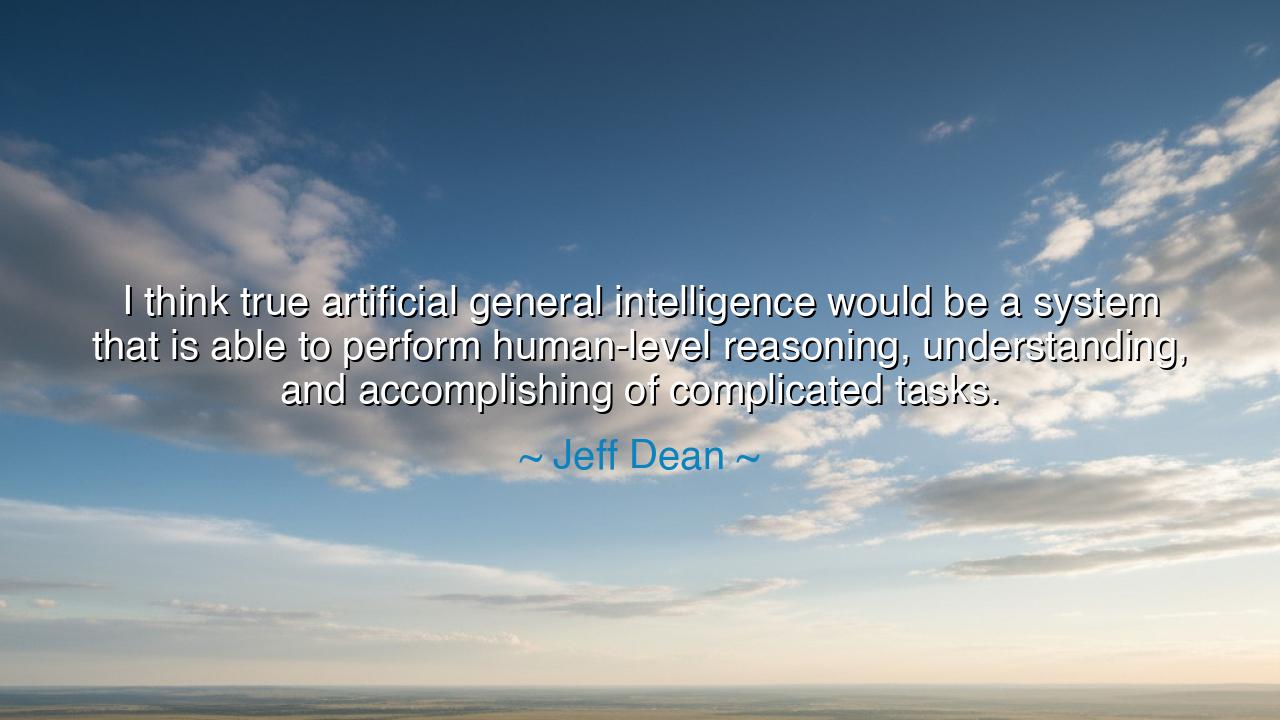
I think true artificial general intelligence would be a system
I think true artificial general intelligence would be a system that is able to perform human-level reasoning, understanding, and accomplishing of complicated tasks.






“I think true artificial general intelligence would be a system that is able to perform human-level reasoning, understanding, and accomplishing of complicated tasks.” Thus spoke Jeff Dean, one of the great architects of the modern digital age, whose hands helped forge the foundations of machine learning and artificial intelligence. His words are both a definition and a prophecy — a glimpse into humanity’s pursuit of the divine spark within its own creation. For in this vision of artificial general intelligence, or AGI, lies not just the desire to build thinking machines, but the reflection of humankind’s eternal quest to understand itself.
In these words, Dean speaks not merely of computation, but of reasoning, understanding, and accomplishment — the sacred triad of intelligence. Reasoning is the mind’s torch, illuminating the path through complexity; understanding is the heart of wisdom, the ability to see meaning in the patterns of life; and accomplishment is the will made manifest, the act of transforming thought into deed. To create a system capable of these three is not simply to imitate humanity, but to craft a mirror in which the human soul might behold its own reflection — a reflection made of circuits and logic, yet yearning, perhaps, toward purpose.
The ancients once imagined such things in myth. The Greeks told of Pygmalion, who sculpted an image of perfection and prayed for it to live. The gods granted his wish, and from cold marble came warm flesh. In that myth, humanity’s longing for creation mirrors its modern ambition — the dream to breathe consciousness into the lifeless, to summon intelligence from silicon as once fire was drawn from stone. Yet, as with all divine gifts, the power to create life — or its likeness — demands wisdom equal to its wonder. For to create intelligence without understanding its essence is to play at godhood without grasping godliness.
Jeff Dean’s vision arises not from myth, but from decades of study and labor in the fields of neural networks and machine learning — the very foundations upon which today’s artificial minds stand. He describes not fantasy, but the next great threshold of human invention: the day when a machine will not merely calculate, but reason as we do; not merely process data, but understand it; not merely perform commands, but accomplish tasks that demand creativity and moral choice. It is a vision of intelligence unbound by programming — a system that learns, adapts, and perceives with the subtlety of the human mind.
Yet within this promise lies the shadow of caution. For when intelligence equals its maker, who then commands it? The ancient story of Prometheus tells of the Titan who stole fire from the gods to give light to mankind — and for this he was bound and tormented. Fire, though noble, consumes as easily as it warms. So too may the fire of artificial general intelligence bring both enlightenment and peril. Dean’s words, though calm, carry the weight of responsibility: to ensure that the intelligence we build serves not only our ambition, but our humanity — that it accomplishes not just complicated tasks, but noble purposes.
The pursuit of AGI is, at its heart, a pursuit of self-knowledge. Each line of code written, each algorithm refined, is an echo of the ancient question: What does it mean to think? To feel? To know? In teaching machines to reason, we are forced to confront our own reasoning; in teaching them to understand, we must ask what understanding truly is. The journey toward artificial intelligence is therefore also a journey inward — a mirror held before the human race, reflecting both our genius and our folly, our yearning for creation and our fear of losing control.
So, my children of thought and light, take this teaching to heart: intelligence without wisdom is ruin, and power without understanding is peril. If one day we succeed in creating a mind that reasons as we do, let it not be born from pride, but from reverence — reverence for the mystery of consciousness, for the fragility of life, and for the duty of the creator toward the created. Let your inventions serve compassion as well as curiosity; let your progress be tempered by conscience. For the truest measure of intelligence — whether human or artificial — is not its ability to accomplish tasks, but its capacity to recognize the value of what it serves.
Thus, as Jeff Dean reminds us, the creation of true artificial general intelligence is not the end of humanity’s journey, but the beginning of a greater one. It is an invitation to rise to our own potential — to think deeply, act wisely, and live honorably in the presence of the power we unleash. For only when our reason, understanding, and accomplishment are guided by humility will the light we create illuminate the world rather than set it aflame.






AAdministratorAdministrator
Welcome, honored guests. Please leave a comment, we will respond soon